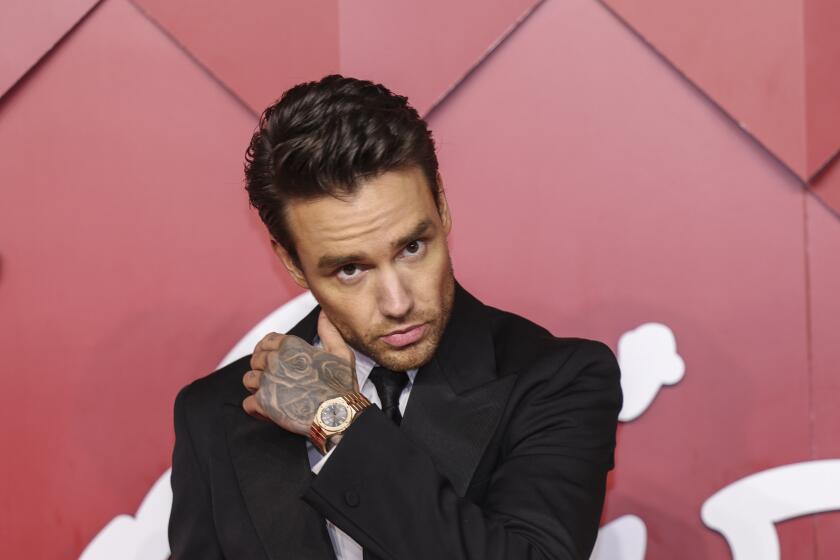Marcia Clark, former O.J. prosecutor, leaves her trials behind and becomes a career-woman role model

Marcia Clark discusses Sarah Paulsonâs Emmy-winning portrayal of her in âThe People v. OJ Simpsonâ.
Two decades before presidential hopeful Hillary Clinton became the target of nonstop, unsolicited advice on how to win the White House â smile more, change that hairstyle, lose the pantsuit â the media were focused on Marcia Clark and all her missteps toward winning the trial of the century.
As she worked to convict beloved football hero O.J. Simpson in the murders of wife Nicole Brown Simpson and Ronald Goldman, Clark herself was being tried by the press for her âdisastrousâ hairstyle, those âdowdyâ dress suits and a âsly, coquettishâ demeanor that had no place in a courtroom, let alone in the first nationally televised murder trial.
Defense attorney Johnnie Cochran mocked the single mother when she expressed a time conflict due to babysitting issues, and Clarkâs estranged husband publicly questioned her dedication as a mother because of all the time she was spending on the case (he was at least kinder than her first husband, who sold old, topless photos of Clark to the tabloids).
âIt was a painful chapter in my life that I certainly didnât want to revisit,â says Clark, 63, whoâs now a bestselling author of crime novels and a defense attorney working with L.A.âs indigent population. âLittle did I know 2016 was going to be the year it all came back.â
Renewed interest in the 1995 trial was ushered in by the FX miniseries âThe People v. O.J. Simpson: American Crime Story,â and later, ESPNâs documentary, âOJ: Made in America.â The productions became two of TVâs biggest events of the year, and both presented a very different side of Clark than was apparent during the trial.
Their portrayals of a strong, unflappable Clark battling it out in a manâs world ran counter to conventional wisdom of Clark as a woman in over her head, a struggling amateur up against Simpsonâs slick, high-paid Dream Team.
Twenty years after losing the trial, Clark is finally emerging as the victor.
Sheâs resurfaced as an inspirational figure in a new wave of feminism bolstered by Clintonâs candidacy (even if it failed), President-elect Donald Trumpâs boasts of sexually assaulting women, and the collective power of millions of women on social media who now connect on issues like sexism in the workplace, reproductive healthcare and outing serial rapists in their respective communities.
âI never saw that coming,â says Clark of the newfound respect and recognition. âI was dreading all that [O.J. trial] stuff coming up again, but clearly, times have changed. Thereâs more of an awareness about what women go through in the workplace. Itâs certainly not perfect, but boy was I pleasantly surprised.â
No one appeared to recognize Clark recently in a crowded deli near her Calabasas home. Her jeans, sneakers, fitted black T-shirt and straight (not permed) hair were a far cry from the courtroom dress suits and sensible pumps sheâs gone down in history as wearing.
Over lunch, she spoke of her sixth crime novel, âMoral Defense,â and a television pilot of the bookâs prequel, âBlood Defense,â that sheâd just sold to NBC. Clark also says sheâs in early talks to host a true crime show.
âIâm all about crime â boringly consistent, I know,â jokes Clark, who started her early career in law as a defense attorney.
Her new novel, which was released on election day, is the second installment in the Samantha Brinkman series. It follows the tough but fallible defense attorney as she does whatever it takes to help her clients walk, even if it means bending hard-held beliefs about truth and justice.
âWith Sam, I get to make darker observations about the criminal justice system from the defense point of view, â says Clark, whose previous series of crime novels followed another woman into the courtroom, prosecutor Rachel Knight. âRachel was a fairly earnest character, a prosecutor. Samantha gives me a chance to say things I could never with Rachel.â
Marcia Rachel Clark was born in Alameda, Calif., to Orthodox Jewish parents. She dreamed of being a crime writer, or an off-Broadway actor â two passions that clearly helped her cut a path as a high-profile trial lawyer.
After dabbling in a career with the State Department, Clark went back to school, attending UCLA where she studied law and eventually became a defense lawyer. In 1981, she joined the Los Angeles County district attorneyâs office as a prosecutor.
I loved my job ⌠then the Simpson case happened.â
— Marcia Clark
âI wanted to be the good guy prosecutor who did it fair and square, shooting clean, all that stuff,â she says. âFight clean. One who defense lawyers would know wasnât trying to pull a fast one on them. I loved my job ⌠then the Simpson case happened.â
Clark had all but put that painful chapter behind her when her agent informed her that Ryan Murphy was working on a drama about the trial. âI was devastated,â she says.
She had no involvement in the making of the drama or the ESPN documentary, but Murphy did ask her if she wanted to come to an early screening of the miniseries.
âI just couldnât,â says Clark. âThe frustration. The misery. Walking in every day and knowing the wrong thing was going to happen, for all the wrong reasons. I donât think I could go through that heartbreak again.â
The showâs first episode aired in February, and thatâs when the calls from reporters started coming in, asking her how she felt about a portrayal that seemed more even-handed than any before it. She now had to watch it.
âI had one friend on this side, another on this side, and a big glass of wine in the middle,â she says. âIt was painful because it was well done. And it was painful because they really delivered on what it was like to live through that. But it was also amazing.â
When Sarah Paulson was nominated for an Emmy for her portrayal of Clark in the FX miniseries, the actress invited the writer to be her guest at the ceremony in September. Clark hesitated. Eventually she decided to go and support her friend so she âcould yell âYayâ when she won.â
Paulson did end up winning for lead actress in a limited series, and in her acceptance speech, she spoke directly to Clark.
âThe more I learned about the real Marcia Clark, not the two-dimensional cardboard cutout I saw on the news but the complicated, whip-smart, giant-hearted mother of two who woke up every day, put both feet on the floor and dedicated herself to righting an unconscionable wrong, the loss of two innocents â Ron Goldman and Nicole Brown â the more I had to recognize that I, along with the rest of the world, had been superficial and careless in my judgment,â she said. âIâm glad to be able to stand here today in front of everyone and tell you Iâm sorry.â
âThereâs no way I expected that,â Clark says. âI was floored. Afterward people kept coming up and congratulating me, as if I was the one who won.â
Clark is still getting used to her second chance at fame. Now instead of ridicule, sheâs a role model â and she takes it all in stride.
âItâs gratifying when younger women come up and say âI went to law school because of you,ââ says Clark. âMy heart swells, then itâs like wait, are you glad, or do you blame me? Do you want to thank me, or kill me?â
More to Read
The biggest entertainment stories
Get our big stories about Hollywood, film, television, music, arts, culture and more right in your inbox as soon as they publish.
You may occasionally receive promotional content from the Los Angeles Times.











